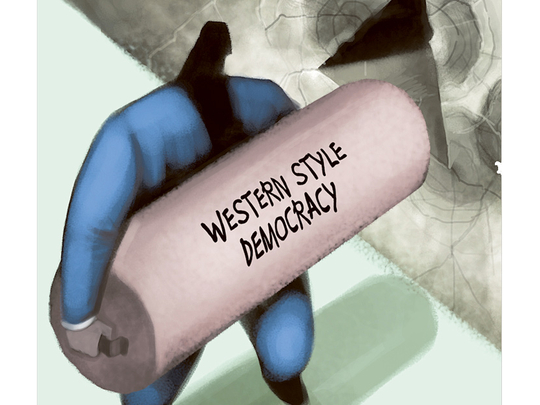
The acute problem facing Iraq is not the threat from the Islamic State of Iraq and the Levant(Isil). Undoubtedly, Isil is a serious threat, but not one that can hold the development of Iraq in the long run. Even changing the politicians will not bring peace and stability. The biggest problem — and the hardest one to solve, which has hindered the advance of the Iraqi people — is the lack of modern political culture. This is broadly defined as “civil and ordinary change of power”.
Although Nouri Al Maliki has reluctantly agreed to step down from the post of prime minister, forming a new government could take months. Poor American strategists thought about a decade ago they could “democratise the Iraqis” by simply “writing a modern constitution, and having multiple political parties”. That, of course, was easier said than done.
For the Americans, the only historical experience of occupation was only after the Second World War, mainly in Germany and Japan. That experience convinced them that bringing modern democracy to nations is possible. Both Germany and Japan have a different political culture than that of the Arabs. Germany is part of Europe’s historic development, with an early experience of free elections and peaceful change of political power in their politics. Japan has easily accepted a western political culture, as it had for long been looking to the West as a model.
It is widely known that Iraq is difficult place to run. King Faisal I, who was appointed to the throne of Iraq by the British authorities in the 20th century, has referred to that difficulty in his alleged memoir, published after his death. Out of nine men who have ruled Iraq since the end of the First World War, whether as kings or presidents, only one has died a natural death — Abdul Rahman Aref, who passed away in Istanbul after he was ousted by the Baath Party. The others were either murdered (including one who died of poisoning) or hanged. Four American presidents, starting from George Bush Sr to Barack Obama so far have pounded Iraqi territory with bombs and artillery. So it is a very dangerous undertaking, this business of ruling Iraq.
Al Maliki, the outgoing prime minister, is suspicious and over cautious by nature. He took the office of premier, alongside those of defence and interior. He also took control of the finances and the secret police and intelligence agencies. This is because he trusts nobody. He wanted all the power in his own hands. That is contrary to democratic practice. For eight years nothing was achieved for ordinary Iraqis in terms of health care and security. On an average, more than 1,000 Iraqis where killed every month during Al Maliki’s time in office. However, his troops retreated hastily when confronted by Isil in northern Iraq, leaving the population to fend for itself. Al Maliki also alienated every single political group.
He has been a prominent member of the powerful Dawa party, which opposed the regime of Saddam Hussain. Al Maliki was in charge of secret operations. Because of the circumstances, and the hard pursuit of Saddam’s intelligence apparatus, Dawa party members were very vigilant and secretive. Throughout his life, Al Maliki, living under another name, could trust nobody. That is why he showed animosity towards with his own closest allies, all Shiites, like the powerful Al Hakim and Al Sadr families.
Iraq’s Sunnis were against Al Maliki and his allies, given the purge of Baath members and the liquidation of mainly Sunni officers. For months, Sunni tribes where holding sit-ins, in defiance of Al Maliki’s polices. Their protests were peaceful and they demanded political reforms. Al Maliki’s government was not lending them a sympathetic ear. Things deteriorated and eventually Isil appeared over the horizon in the Sunni areas. And there was no resistance against them. But Al Maliki did not stop there. He aroused the suspicions, even animosity of the Kurds, the third major component of the Iraqi nation. He accused them of playing host to Isil and Al Qaida elements. This infuriated the Kurds, to the extent that they withdrew their ministers in the Al Maliki government, including prominent Foreign Minister Hoshyar Zebari. For long Al Maliki was paying lip service to the Iranians. Soon Grand Ayatollah Al Sistani of Najaf issued a fatwa to have a change in Iraqi leadership. Al Maliki turned against the Iranians, accusing them of interfering in the internal politics of Iraq. Even Al Sistani with all his religious influence with the Shiite population, could not convince Al Maliki to let go. Such is the love of power, which blinds people.
The prime minister designate Haider Al Abadi has lived for a while in the West, and is aware of the political culture of democracy. He has support regionally and internationally, and is faced with a very difficult, almost impossible task. It is like teaching an elephant how to dance. But even that may be easier than practising democracy in the fragmented country.
Mohammad AlRumaihi is a professor of political sociology at Kuwait University. You can follow him on Twitter at www.twitter.com/@rumaihi42










